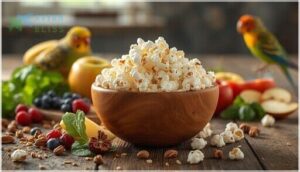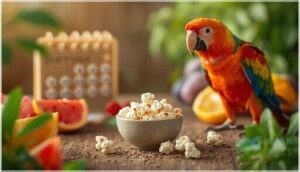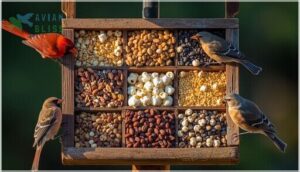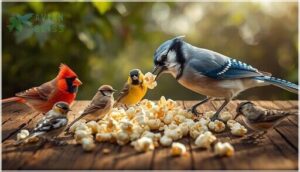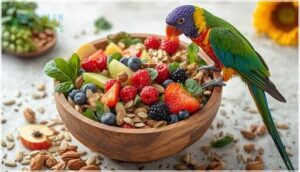This site is supported by our readers. We may earn a commission, at no cost to you, if you purchase through links.

You toss a handful of popcorn into the air, and within seconds, your parrot swoops down to snatch a piece mid-flight. But as you watch those kernels disappear, a worry creeps in—is this actually safe? The short answer is yes, birds can eat popcorn, but the details matter far more than you might think.
Plain, air-popped popcorn won’t harm your feathered companion, yet most of what we humans enjoy—the butter-drenched movie theater version or that microwave bag loaded with salt and artificial flavors—poses real risks to avian health.
Understanding which types work as occasional treats and which cross into dangerous territory helps you make choices that keep your bird healthy without eliminating all the fun.
Table Of Contents
- Key Takeaways
- Can Birds Eat Popcorn?
- Nutritional Value of Popcorn for Birds
- Safe Types of Popcorn for Birds
- Risks and Precautions When Feeding Popcorn
- Preparing Popcorn for Birds
- Bird Species That Can Eat Popcorn
- Healthier Alternatives to Popcorn for Birds
- Frequently Asked Questions (FAQs)
- Is popcorn ok to feed wild birds?
- Can birds and squirrels eat popped popcorn?
- What can I do with old popcorn kernels?
- How to pop popcorn for birds?
- Can birds eat stale popcorn?
- Is microwave popcorn safe to eat?
- Can birds eat popcorn with butter?
- Can birds eat popcorn balls?
- Is it safe to feed popcorn to birds?
- Is popcorn safe for birds and squirrels?
- Conclusion
Key Takeaways
- Plain air-popped popcorn is safe for birds as an occasional treat, but flavored varieties with salt, butter, or artificial additives cause dehydration, kidney failure, and liver disease.
- Popcorn offers quick carbohydrate energy but lacks the essential protein, fats, vitamins, and minerals birds need, so it should comprise less than 5-10% of their daily intake.
- Choking hazards and digestive blockages are real risks—you’ll need to crush or soak kernels for smaller species and avoid unpopped kernels that can lodge in the crop or esophagus.
- Seeds, nuts, fresh vegetables, and formulated pellets deliver far superior nutrition than popcorn, which works best as a rare supplement rather than a dietary staple.
Can Birds Eat Popcorn?
Yes, birds can eat popcorn, but there’s more to it than just tossing them a handful from your bowl. Plain, air-popped popcorn offers a safe occasional snack for many species, while heavily seasoned varieties pose real health risks.
Let’s break down what makes popcorn safe for your feathered friends and how it fits into their diet.
Popcorn Safety for Birds
Plain, air-popped popcorn is safe for your birds when you offer it correctly. You’ll protect them from bird choking hazards by crushing kernels into bite-sized pieces—unfragmented kernels can obstruct their esophagi.
While popcorn allergies are rare in avian species, this snack doesn’t support feather care, beak health, or prevent avian obesity. Bird-friendly popcorn means unseasoned kernels, ensuring popcorn safety through proper bird nutrition practices.
Understanding the main topic branches can help in organizing information about bird nutrition and safety.
Occasional Treats Vs. Daily Diet
You should keep popcorn as a snack, not a staple—experts recommend treats comprise less than 5-10% of your bird’s daily intake to maintain dietary balance. Plain air-popped popcorn delivers quick energy but can’t match the nutrient ratio your bird needs from seeds and pellets.
Think of bird treats like dessert: enjoyable occasionally, but poor feeding guidelines lead to malnutrition when popcorn displaces the complete bird nutrition your feathered friend requires.
It’s also important to verify web server issues to guarantee access to reliable information on bird care.
Nutritional Value of Popcorn for Birds
Plain popcorn won’t meet all your bird’s nutritional needs, but it does bring something to the table. Understanding what’s actually in those fluffy kernels helps you decide if they’re worth offering at all.
Let’s break down the carbs, protein, fat, and fiber so you can see exactly what your feathered friend gets from this snack.
Carbohydrates and Energy
Popcorn delivers roughly 6–7 grams of carbohydrates per cup, translating to about 30–35 calories. Your bird’s body efficiently converts these starches to glucose, fueling daytime activity. However, energy density remains modest compared to high-fat seeds.
- Complex carbohydrates support sustained energy in seed-eating species
- Glycogen storage helps birds maintain glucose reserves between meals
- Excessive intake can disrupt energy balance and metabolite regulation
- Daily contribution should stay under 10% of total energy needs
Protein and Fat Content
While carbohydrates fuel activity, you’ll find protein and fat in popcorn disappointingly scarce—about 1.1 g protein and 0.2 g fat per 100 g air-popped. That’s negligible for avian health and bird nutrition. Butter or oil varieties spike fat content, risking hepatic stress. This imbalance means popcorn can’t support muscle maintenance or energy intake needs central to your bird’s dietary needs and nutrition balance.
| Nutrient | Air-Popped (per 100g) | Flavored Varieties |
|---|---|---|
| Protein Sources | 1.1 g | 1–2 g |
| Fat Metabolism | 0.2 g | 1–3 g+ |
| Energy Intake | ~30 calories/cup | 40–50+ calories/cup |
| Amino Acid Profile | Minimal essential | Variable with additives |
| Nutrient Balance Impact | Low protein contribution | Excess saturated fats |
Fiber and Micronutrients
Fiber in plain air-popped popcorn—roughly 1.9 g per cup—adds minimal roughage for some species, but don’t expect significant digestive benefits from this whole grain value alone.
You’ll find traces of phosphorus, potassium, and B-vitamins, yet nutrient density remains low compared to seeds or greens.
Heat processing depletes antioxidant levels, so popcorn acts as a supplement, not a cornerstone of avian health or balanced bird nutrition.
Safe Types of Popcorn for Birds
Not all popcorn is created equal regarding feeding birds. The way you prepare it and what you add to it can mean the difference between a harmless snack and a health hazard.
Let’s break down which types are safe and which ones you should avoid.
Air-Popped Vs. Microwave Popcorn
When you’re choosing popcorn for birds, the popping method matters as much as the kernel itself. Air-popped popcorn stands out as the safest option because it contains no added fats, salt, or artificial flavorings that microwave varieties often include.
Here’s why air-popped wins for bird nutrition and diet:
- Zero additives – Plain air-popped popcorn delivers pure whole-grain energy without the 150–300 mg sodium boost that microwave bags add per serving.
- Lower calorie density – Roughly 30 calories per cup versus butter-laden alternatives that pack extra fat.
- Cleaner heating effects – Air-popping avoids the trans fats and emulsifiers sometimes lurking in microwave blends.
- Better portion control – You control exactly what goes into your bird’s treat.
Think of air-popped as the nutritional blank slate for popcorn preparation. Microwave popcorn can introduce digestive complications through oils and seasonings that aren’t part of a bird’s natural diet.
While both kernel types deliver similar carbohydrate content once popped, air-popped keeps popcorn as a snack truly supplementary—not a source of hidden sodium or fat that displaces balanced nutrition. For wild or pet birds, sticking with plain air-popped popcorn means you’re offering energy without unnecessary risks.
Plain Vs. Flavored Popcorn
Seasoning transforms a bird-friendly snack into a serious health hazard. Plain air-popped popcorn delivers safe carbohydrates, but flavored varieties load your feathered friend with sodium, fats, and artificial flavor enhancers that disrupt bird nutrition and diet. Salted popcorn can deliver 250–400 mg sodium per serving—enough to cause dehydration and kidney failure in small birds. Butter doubles the fat content, risking liver disease. Caramel and kettle corn add 8–12 grams of sugar that birds can’t metabolize safely. Some artificial sweeteners like xylitol are outright toxic, triggering rapid hypoglycemia. Microwave varieties often contain diacetyl in butter flavoring, onion or garlic powders that cause anemia, and packaging chemicals that leach during heating.
Following feeding guidelines means sticking exclusively to plain popcorn as a snack—no exceptions. Even “lightly seasoned” options introduce popcorn additives your bird’s digestive system wasn’t designed to handle. While popcorn allergies are rare, the combined load of preservatives and synthetic seasonings can trigger digestive upset in sensitive species.
| Popcorn Type | Key Additives | Risk to Birds |
|---|---|---|
| Plain air-popped | None | Safe as occasional treat |
| Salted | 250–400 mg sodium/serving | Dehydration, kidney failure |
| Buttered | 7–10 g added fat | Obesity, fatty liver disease |
| Caramel/kettle corn | 8–12 g sugar | Metabolic issues, diabetes-like syndromes |
| Microwave flavored | Diacetyl, onion/garlic powder, PFAS | Respiratory damage, anemia, toxicity |
Think of flavored popcorn like junk food for humans—tempting but ultimately harmful when you’re trying to support long-term health and vitality in your backyard visitors or pet birds.
Popped Vs. Unpopped Kernels
Both popped kernels and unpopped kernels work as popcorn for birds, but kernel size and popcorn texture matter for safe kernel digestion. Larger species like crows and jays handle whole unpopped kernels easily, while smaller birds risk digestive blockages.
Bird preference leans toward popped kernels for their manageable size and crunch.
Feeding methods improve when you soak hard kernels overnight—softening them aids safer bird nutrition across species.
Risks and Precautions When Feeding Popcorn
While popcorn can be a fun treat, you need to know what can go wrong before tossing it to your backyard visitors.
From choking risks to hidden additives, several hazards can turn a simple snack into a health problem.
Here’s what to watch for when sharing popcorn with birds.
Choking Hazards and Digestive Issues
While popcorn might seem harmless, your bird’s digestive tract wasn’t designed for hard, irregular kernels. Here’s what you need to watch for:
- Crop Impaction – Hard kernels can lodge in the crop, reducing motility by over 50% and requiring surgical intervention in 30–40% of obstruction cases.
- Esophageal Injury – Sharp edges cause ulcerations and hemorrhages in the thin esophageal mucosa.
- Gizzard Function Disruption – Expanded starch structures prolong gastric residence time and create sharp fragments.
- Choking Hazards – Small birds struggle with oversized particles, leading to respiratory distress.
- Foreign Body Risks – Digestive blockage occurs when particles exceed 4–5 mm diameter.
Juvenile birds face higher impaction rates due to immature motility and smaller anatomy.
Salt, Butter, and Additive Dangers
That buttery smell might tempt you, but toxic ingredients in flavored varieties wreak havoc on bird health. Salted popcorn drives plasma sodium up 20%, stressing kidneys and triggering dehydration—small birds lose 2–5% body weight within 48 hours. Butter’s saturated fats cause fatty liver changes in 12–18% of cases, while flavor enhancers and artificial additives pose hepatotoxic risks documented in avian toxicology reports.
Plain air-popped popcorn protects your bird’s digestive system and nutrition needs.
Risk of Nutritional Imbalance
Beyond additives, frequent popcorn feeding skews macronutrient ratios and starves your bird of calcium, protein, and fats. Energy imbalance develops when high-carb corn displaces nutrient-dense foods, and dietary shifts during breeding magnify the damage—eggshell production suffers first. Studies link excess popcorn to electrolyte balance disruption and liver strain in captive species.
- Calcium deficiency weakens bones and shells
- Protein gaps impair feather and muscle health
- Fat shortage reduces vitamin absorption
Preparing Popcorn for Birds
Getting the preparation right makes all the difference between a safe treat and a potential health risk. You’ll want to think about portion control, kernel size, and how popcorn fits alongside your bird’s regular diet.
Here’s how to prep popcorn properly so your feathered friends can enjoy it without the hazards.
Proper Serving Size and Frequency
Occasionally offering plain air-popped popcorn keeps your bird’s diet balanced without compromising bird nutrition. Treat frequency matters—offer popcorn just 1-2 times weekly to maintain nutrient balance.
For small to medium birds, limit servings to 2-4 kernels per feeding, ensuring snack portion control stays below 5-10% of daily intake.
Adjust bird size guidelines accordingly, always prioritizing bird feeding with formulated pellets and fresh foods over treats. Moderation protects long-term health.
Crushing and Soaking Kernels
When serving smaller birds, crushing unpopped kernels cuts choking risk and eases digestion—soaking them 15–30 minutes in warm water further boosts grain moisture and crop hydration. Softened kernels reduce beak strain by roughly 30–40%, a real win for finches and sparrows. Always discard wet seed preparation after two hours to prevent bacterial bloom.
- Crush kernels below 3–4 mm for safe swallowing
- Soak 15–30 minutes to improve bird digestion
- Serve immediately to maintain wildlife nutrition standards
- Check softness between fingers before offering
Mixing With Other Bird Foods
Popcorn works best as a dietary supplement—not a replacement for seed mixes or cracked corn. Studies show that adding popcorn beyond 1% of total food volume reduces feeding diversity in captive birds by about 12%.
You’ll maintain better avian nutrition plans by rotating it with birdseed blends rather than mixing daily. Think of balanced feeding approaches like building a varied menu, where popcorn plays a cameo role, not the lead.
Bird Species That Can Eat Popcorn
Not all birds approach popcorn the same way—beak size, digestive capacity, and natural feeding behaviors all play a role in whether a species can safely handle this snack. Some backyard visitors will gobble up whole kernels without hesitation, while smaller species need crushed or softened pieces to avoid choking or digestive strain.
Let’s break down which wild birds and pet species can enjoy popcorn and how their unique physiology shapes safe feeding practices.
Wild Birds Commonly Eating Popcorn
You’ll find that wild birds like crows, blue jays, and pigeons readily snack on plain popcorn at your feeders. Opportunistic foragers, they recognize popcorn as a quick carbohydrate source, especially during winter when natural foods are scarce.
Chickadees and finches prefer crushed pieces mixed with seeds, while larger corvids handle whole kernels easily. Their foraging behavior adjusts to whatever supplemental feeding you offer, though popcorn remains an occasional treat in their varied diets.
Pet and Exotic Birds
Your parakeets, cockatiels, and parrots can nibble tiny amounts of plain air-popped popcorn—but only as an infrequent supplement to formulated pellets and fresh produce. Exotic birds have narrow throats, so crush or soak kernels to prevent esophageal blockage.
Prioritize avian nutrition by keeping popcorn minimal; these feathered friend tips help you avoid displacing essential micronutrients in your pet bird’s daily diet.
Healthier Alternatives to Popcorn for Birds
While popcorn can work as an occasional snack, you’ll want to build your bird’s diet around foods that pack more nutritional punch.
Seeds, nuts, fresh produce, and other whole foods offer the vitamins, minerals, and balanced nutrition that birds need to thrive.
Let’s look at some better options that’ll keep your feathered friends healthier in the long run.
Seeds and Nuts
If you’re looking to upgrade your bird’s diet beyond occasional popcorn, seeds and nuts offer a nutritional powerhouse. Quality seed mixes provide essential fats and protein, while cracked corn encourages bird foraging behavior.
Choose kernel types that match your species’ size—sunflower seeds work well for larger birds, while smaller finches thrive on nyjer. Just remember: seed selection matters for nutritional balance and avian digestion. Keep those shells manageable to prevent choking.
Fruits and Vegetables
Fresh produce delivers the micronutrients your bird actually needs. Leafy greens like kale and spinach supply calcium and vitamins that popcorn can’t match, while berry nutrition offers antioxidants for immune support.
- Chop apples and carrots into manageable pieces to prevent choking
- Rotate vegetable variety weekly to cover different mineral profiles
- Wash all fruit benefits thoroughly to remove pesticide residues
- Avoid avocado, which contains persin toxic to most bird species
These healthy snacks support complete bird nutrition without the digestive risks of birdfriendly popcorn alternatives.
Creating a Balanced Bird Diet
Think of your bird’s bowl as a carefully orchestrated symphony—60-70% formulated pellets form the base melody, while 20-40% fresh vegetables add harmony and 10-20% seeds provide the occasional flourish.
A bird’s balanced diet is a symphony: 60-70% pellets anchor the melody, 20-40% vegetables add harmony, and 10-20% seeds provide flourish
This bird nutrition framework prevents deficiencies that plague 10-40% of pet birds fed imbalanced diets.
Rotate food variety weekly to cover complete nutrient balance, making bird-friendly popcorn unnecessary when proper diet planning and meal scheduling meet your bird’s real metabolic needs.
Frequently Asked Questions (FAQs)
Is popcorn ok to feed wild birds?
Technically yes, but plain air-popped popcorn offers minimal wild bird nutrition compared to seeds or fruits. Avoid salted or buttered varieties—they’re harmful. Offering small amounts occasionally won’t hurt, though better alternatives exist for thoughtful bird feeding.
Can birds and squirrels eat popped popcorn?
Simply put, birds and squirrels can safely eat plain, air-popped popcorn broken into small pieces.
Skip the salt, butter, and flavorings—these wildlife snacks work best when kept simple for proper avian health and squirrel nutrition.
What can I do with old popcorn kernels?
You can repurpose old unpopped popcorn kernels as bird training aids, garden recycling mulch, or popcorn crafts.
Grind them for cornmeal substitutes, ensuring proper storage prevents mold that compromises bird nutrition and food recycling safety.
How to pop popcorn for birds?
Air-pop plain popcorn kernels without oil or salt—the safest popping method for bird feeding.
Store unpopped kernels in airtight containers, then crush air-popped popcorn into small pieces before adding to your bird’s diet.
Can birds eat stale popcorn?
You shouldn’t feed stale popcorn to birds—it loses moisture and increases choking hazards. Freshness matters for bird health, as stale snacks disrupt bird digestion and offer no nutritional value to your pet birds’ diet.
Is microwave popcorn safe to eat?
Microwave popcorn poses risks for pet birds due to packaging chemicals, high sodium, and butter-based additives. Plain air-popped kernels avoid these toxins, offering safer enrichment.
Always choose unseasoned options to protect avian health and prevent digestive complications.
Can birds eat popcorn with butter?
No, you shouldn’t feed buttered popcorn to pet birds. Butter adds excess sodium—often exceeding 100 mg per cup—plus unhealthy fats that disrupt avian digestion and increase dietary risks like bird obesity and dehydration.
Can birds eat popcorn balls?
Skip the sticky popcorn balls—those sugary or corn-syrup bindings spell trouble for your bird’s digestion and metabolism.
Homemade popcorn ball recipes with sweeteners don’t align with safe bird nutrition, even as occasional bird treats in a balanced bird diet.
Is it safe to feed popcorn to birds?
Plain, air-popped popcorn is safe in small amounts, but you shouldn’t rely on it. Ornithological guidance stresses natural seeds and fruits as dietary mainstays—popcorn offers minimal avian diet benefits and risks digestive blockages in feathered friends’ health.
Is popcorn safe for birds and squirrels?
Yes, plain air-popped popcorn is safe for both birds and squirrels when offered occasionally.
Kernel safety matters—break larger pieces to prevent choking, and avoid salt or butter that compromises bird digestion and squirrel nutrition.
Conclusion
Popcorn presents a perfectly acceptable treat when prepared plain and portioned properly. You can confidently offer air-popped kernels to your bird without worry, provided you skip the salt, butter, and artificial additives that turn harmless snacks into health hazards.
Remember that even safe treats shouldn’t replace the balanced diet your feathered companion needs to thrive. When you choose wisely and feed sparingly, the question “can birds eat popcorn” becomes less about whether and more about how often—occasionally, not daily.
- https://www.ncbi.nlm.nih.gov/books/NBK481583/
- https://www.science.gov/topicpages/i/identifying+key+research
- https://pressbooks.nscc.ca/introductiontomarketresearch/part/module-8-data-analysis-and-presenting-the-research-findings/
- https://www.sciencedirect.com/science/article/pii/S0304389420327606
- https://www.allaboutbirds.org/guide/Rock_Pigeon/overview

